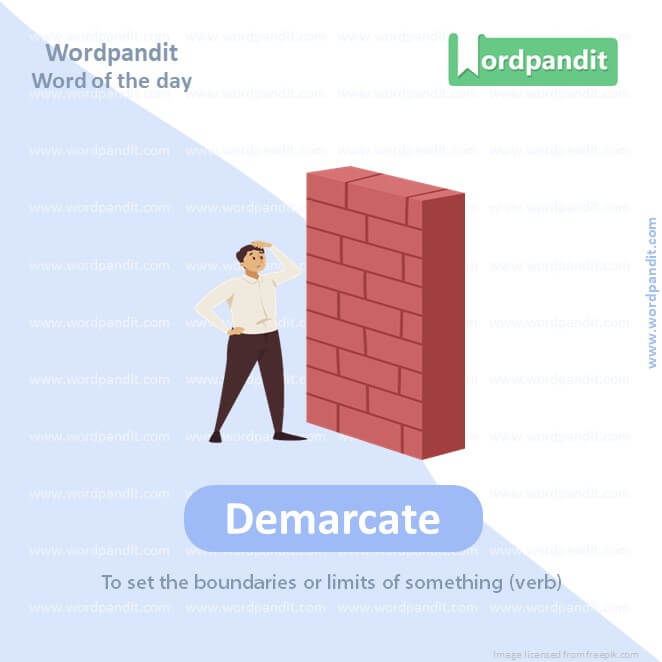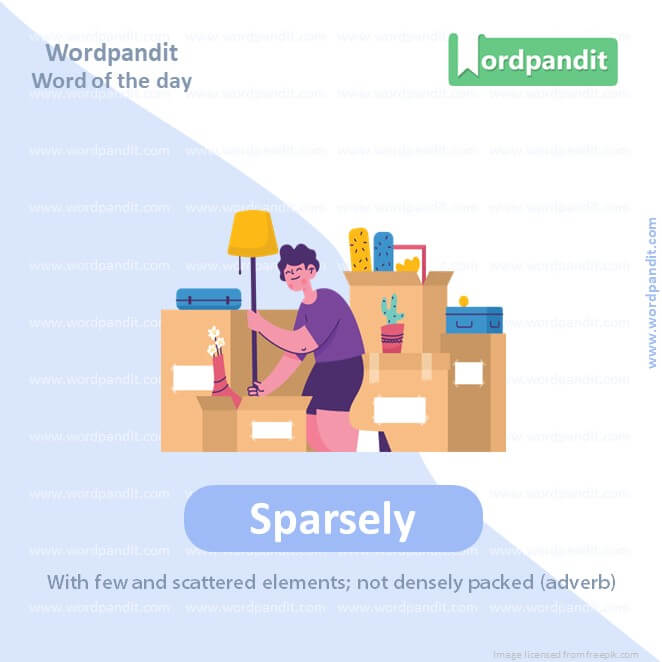Daily Vocabulary Words: List of Daily Used Words
Hi there. Welcome to this special section @ Wordpandit.
Our endeavour here is straightforward: highlighting important daily vocabulary words, you would encounter in The Hindu. This is your repository of commonly used words; essentially, we are posting a list of daily used words. Hence, this has significant practical application as it teaches you words that are commonly used in a leading publication such as The Hindu.
Visit the website daily to learn words from The Hindu.

WORD-1: Demarcate
CONTEXT: A nation is defined not by the borders that demarcate it but by the people who live in it.
SOURCE: The Hindu
EXPLANATORY PARAGRAPH: Imagine you have a big box of crayons and you want to share them with your friend. You decide to split them up so that you each have your own colors. Demarcating is like drawing a line on the table to show which crayons are yours and which are your friend’s. It’s a way of marking where one thing ends and another begins.
MEANING: To set the boundaries or limits of something (verb).
PRONUNCIATION: dee-MAR-kate
SYNONYMS: distinguish, divide, separate, differentiate, delineate, mark off
USAGE EXAMPLES:
1. The river demarcates the border between the two countries.
2. Fences were erected to demarcate the private property from public land.
3. They used flags to demarcate the different sections of the field.
4. The teacher demarcated the areas for different activities in the classroom.

WORD-2: Sparsely
CONTEXT: The institution of the FMR, as a formalised regime of the movement of citizens across the sparsely populated border to within 16 kilometres of it, for trade and commerce, was a nod to India’s Act East policy.
SOURCE: The Hindu
EXPLANATORY PARAGRAPH: Think about when you sprinkle a little bit of salt on your popcorn. If you don’t use a lot of salt and only a few pieces get some, that’s like something being sparsely done. It means there’s not much of something in a big area or space.
MEANING: With few and scattered elements; not densely packed (adverb).
PRONUNCIATION: SPAHR-slee
SYNONYMS: thinly, lightly, scantily, infrequently, meagerly
USAGE EXAMPLES:
1. The desert is sparsely populated with plants and animals.
2. She sparsely decorated her room, preferring a minimalist style.
3. Trees are sparsely distributed in the tundra region.
4. Information on the topic was sparsely available.

WORD-3: Porosity
CONTEXT: The drug trade is enabled not only by the border’s porosity but also by the relative lack of strong law enforcement with the cooperation of residents.
SOURCE: The Hindu
EXPLANATORY PARAGRAPH: Imagine a sponge and how it can soak up water. That’s because it has lots of tiny holes that let the water in. Porosity is a word that talks about how something has many little holes and can absorb liquid or air.
MEANING: The quality of being porous, or full of tiny holes through which liquid or air can pass (noun).
PRONUNCIATION: puh-ROS-i-tee
SYNONYMS: permeability, sponginess, absorbency, openness, penetrability
USAGE EXAMPLES:
1. The porosity of the soil affects how much water it can hold.
2. Scientists measured the rock’s porosity to understand its ability to store oil.
3. High porosity hair needs special care to retain moisture.
4. The porosity of the sponge makes it excellent for cleaning spills.
WORD-4: Meritocracy
CONTEXT: Proponents and critics of meritocracy offer compelling arguments about its impacts on society, highlighting its virtues and shortcomings.
SOURCE: The Hindu
EXPLANATORY PARAGRAPH: Imagine if you got to be the leader of a team because you were really good at playing the game, not because you were the oldest or your parents were friends with the coach. Meritocracy is when people get to have special titles or jobs because they’re really good at what they do, not because of who they know or where they come from.
MEANING: A system in which people are rewarded and advanced based on their abilities and achievements (noun).
PRONUNCIATION: mer-i-TOK-ruh-see
SYNONYMS: fairness, skill-based, ability-driven, competence-based, talent-oriented
USAGE EXAMPLES:
1. The company promotes a meritocracy, where employees advance based on performance.
2. He believed in a meritocracy where hard work and talent are recognized.
3. The scholarship promotes meritocracy by awarding students based on their academic achievements.
4. Critics argue that true meritocracy is hard to achieve in society.

WORD-5: Envisioned
CONTEXT: He envisioned a future, specifically 2034, as a society where social class and mobility were determined solely by intelligence and effort, as measured through standardized testing and educational achievement
SOURCE: The Hindu
EXPLANATORY PARAGRAPH: When you close your eyes and imagine you’re a superhero flying high in the sky, that’s like envisioning. It means you’re using your imagination to see something in your mind that isn’t really there.
MEANING: Imagined or thought of something as a future possibility (Verb).
PRONUNCIATION: en-VIZH-und
SYNONYMS: imagined, pictured, visualized, dreamed, conceived, foresaw
USAGE EXAMPLES:
1. She envisioned a world where people lived in peace.
2. The architect envisioned a building that would stand out in the city skyline.
3. They envisioned a future where technology made life easier for everyone.
4. He had always envisioned himself winning the championship
WORD-6: Eroding
CONTEXT: Sandel’s critique focuses on the divisive consequences, arguing that meritocracy fosters a sense of entitlement among the successful and resentment among those left behind, thereby eroding social cohesion.
SOURCE: The Hindu
EXPLANATORY PARAGRAPH: Think about when you build a sandcastle near the water, and waves come and wash away some of the sand little by little. Eroding is when something slowly gets worn away or breaks down, like the sandcastle losing sand.
MEANING: Gradually wearing away or weakening (verb).
PRONUNCIATION: ih-ROH-ding
SYNONYMS: wearing away, deteriorating, diminishing, undermining, weakening
USAGE EXAMPLES:
1. The shoreline is eroding due to constant wave action.
2. Public trust in the institution has been eroding over the years.
3. Acid rain is responsible for eroding the surfaces of historical monuments.
4. His confidence eroded after several failures.
WORD-7: Contingency
CONTEXT: Post-structuralism highlights the fluidity and contingency of merit, suggesting that meritocratic systems are inherently subjective and can reinforce existing inequalities.
SOURCE: The Hindu
EXPLANATORY PARAGRAPH: Imagine you’re planning to have a picnic outside, but you also have a plan to watch movies inside if it rains. That plan for rain is like a contingency. It’s a special plan you make for something that might happen, even if you’re not sure it will.
MEANING: A future event or circumstance that is possible but cannot be predicted with certainty (noun).
PRONUNCIATION: kun-TIN-juhn-see
SYNONYMS: possibility, eventuality, emergency, chance, provision
USAGE EXAMPLES:
1. They made contingency plans in case the event had to be moved indoors.
2. The project’s budget includes a contingency for unexpected costs.
3. It’s important to have a contingency plan for technical difficulties during the presentation.
4. The military prepares contingencies for various scenarios.
WORD-8: Inadvertently
CONTEXT: The Aristocracy of Talent, he explores how meritocracy, initially a force for progress and social mobility, has inadvertently fostered new inequalities by becoming somewhat hereditary, with privileges being passed down generations.
SOURCE: The Hindu
EXPLANATORY PARAGRAPH: Imagine you accidentally knock over your glass of milk while reaching for a cookie. You didn’t mean to do it; it just happened without you thinking about it. That’s what inadvertently means – doing something by accident or without intending to.
MEANING: Without intention; accidentally (adverb).
PRONUNCIATION: in-ad-VER-tent-lee
SYNONYMS: unintentionally, accidentally, unknowingly, unawares, mistakenly
USAGE EXAMPLES:
1. He inadvertently deleted the file from his computer.
2. The email was sent to the wrong person inadvertently.
3. She apologized for inadvertently stepping on his foot.
4. Inadvertently, he revealed the surprise party plans.
WORD-9: Beleaguered
CONTEXT: The need to accept a ceasefire and allow increased humanitarian assistance to reach the beleaguered people in Gaza.
SOURCE: The Hindu
EXPLANATORY PARAGRAPH: Imagine you’re in a fort and all around you are people trying to get in and make you give up. You’re feeling really pressured and surrounded by troubles. That’s what being beleaguered is like – facing a lot of problems or difficulties from all sides.
MEANING: Besieged by problems or difficulties; under a lot of pressure (adjective).
PRONUNCIATION: bih-LEE-gurd
SYNONYMS: besieged, under siege, troubled, harassed, stressed, pressured
USAGE EXAMPLES:
1. The beleaguered company faced criticism from all sides.
2. He felt beleaguered by the constant demands of his job.
3. The beleaguered city was cut off from supplies during the siege.
4. She provided support to her beleaguered friend during the tough times.

WORD-10: Visceral
CONTEXT: He included in his cabinet Finance Minister Bezalel Smotrich and National Security Minister Itamar Ben Gvir who represent groups that exhibit the most visceral animosity for Arabs and reject any possibility of compromise with the Palestinians. Given his dependence on right-wing support, Mr. Netanyahu has consistently rejected the ‘two-state solution’.
SOURCE: The Hindu
EXPLANATORY PARAGRAPH: Think about the feeling you get in your tummy when you’re super excited or really scared. That deep, strong feeling that seems to come from your belly is called visceral. It’s a way to describe emotions that are really powerful and come from deep inside you.
MEANING: Relating to deep inward feelings rather than to the intellect (adjective).
PRONUNCIATION: VIS-er-al
SYNONYMS: instinctive, deep-seated, gut, intuitive, primal, inherent
USAGE EXAMPLES:
1. She had a visceral reaction to the horror movie.
2. His speech stirred a visceral excitement among the crowd.
3. The issue provoked a visceral response from the community.
4. He trusted his visceral instincts to make the decision.
vocabulary cards
In the realm of language learning, an individual’s arsenal is incomplete without the essential tool of ‘vocabulary cards.’ Vocabulary cards, also known as flashcards, are a potent method to imprint new words, phrases and their meanings into our memory. They have been used for centuries for their effective learning approach and cognitive retention benefits.
Vocabulary cards are typically designed with a term on one side, and its meaning or translation on the other. This learning tool engages our brain’s active recall, a vital process in long-term memory imbibing. However, these vocabulary cards should not just be seen as standalone pieces of paper; they are keys to unlocking the treasuries of new languages.
To harness the best results from vocabulary cards, one must follow a planned method. Firstly, the words and phrases should be relevant to the learner’s requirement. Niche words about the user’s profession or daily life activities are particularly profitable choices. Secondly, incorporate these flashcards into regular study routine to ensure consistent revising. It is suggested to do short, multiple study sessions throughout the day, rather than one long session.
Another significant factor in learning vocabulary cards is the Leitner System, an age-old method of spacing the revision of cards based on the learner’s proficiency. The cards that are difficult to remember should be reviewed more frequently than the ones that are easier.
Utilizing vocabulary cards provides a hands-on approach, reinforcing knowledge with each use. It helps learners to interact with the language, promoting better understanding and long-term retention. As such, vocabulary cards are far more than simple learning aids; they provide a comprehensive system for enhancing vocabulary, setting learners on the fast track to language proficiency.
In conclusion, vocabulary cards’ value should not be underrated. Explore these smart flashcards and begin your journey towards linguistic mastery consistently and effectively.













